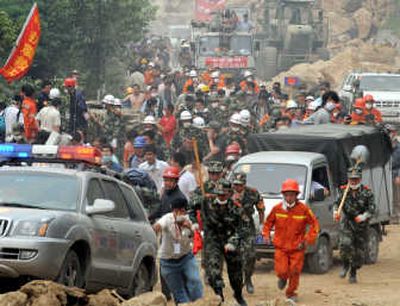Fear of floods grips China quake survivors

BEICHUAN, China – The orange-suited emergency workers had just pulled someone out of the rubble alive Saturday when a chilling cry reverberated around the tilting high-rises, the toppled construction cranes and the market littered with bodies: The valley was about to flood.
In a panic, thousands of soldiers, earthquake survivors and aid workers raced headlong for the hills, some helping babies and old people negotiate a mountain of jagged debris. “Move it!” yelled one commander. “Don’t worry about your equipment – just get to higher ground,” barked another.
Authorities issued the warning to evacuate Beichuan, fearing that water from a choked river might overrun this obliterated town near the epicenter of Monday’s magnitude 7.9 quake. The official New China News Agency reported that a lake created by earthquake landslides “may burst its banks at any time.”
“I don’t want to die,” one survivor cried out, kneeling in terror on a rubble pile, his head repeatedly touching the ground in prayer.
The government in Beijing has been playing down the threat of another disaster as it works overtime to reassure the public. But the warning Saturday underscored how jittery people’s nerves still were, given the threat of aftershocks and the risk that flooding in this mountainous area could claim more lives.
The confirmed death toll Saturday rose to 28,881, Cabinet spokesman Guo Weimin said, with 10,600 still buried in Sichuan province. In other developments, two U.S. Air Force cargo planes were expected to arrive in Sichuan today from Hawaii and Alaska loaded with tents, blankets, food and generators, the first aid flight from the United States.
A team of 15 emergency workers, part of a bigger group that flew in from eastern Jiangxi province, had spent the last two days fanned out on the debris fields looking for survivors. Most carried ropes, shovels and picks, with one member wielding a life-detection device, essentially a 5-foot pole with a cable equipped with a microphone and video camera.
The team moved along, with members banging on debris with hammers or shovels and yelling, “Anyone in there?” and “Can you hear me?” before listening for a response.
Shortly after noon they located the building and lowered the cable into a crevice. Emergency worker Ye Bin, who was on the device when the man was found, said he heard a faint voice in response to their calls. For 2 1/2 hours, the crew worked by hand to clear the rubble from around the man, eventually freeing him.
The victim, underground for nearly five days, had been on the second floor of a six-story building when the quake struck. He landed face down in an 18-inch space between collapsed floors.
“He came out very strong, immediately asked about his family and had us call their cell phone,” said Pan Yonghong, commander of the disaster relief team. “As every day passes, the chances of finding survivors are reduced. But if there’s a 1 percent chance, we’ll continue to exert 100 percent effort.”